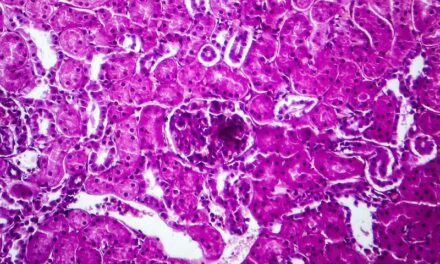FDA has granted market clearance for the first test that can help determine whether a specific type of kidney disease, called membranous glomerulonephritis (MGN), is due to the body’s rejection of its own kidney tissue (autoimmune) or to another cause, such as infection.
MGN is a chronic kidney disease that causes damage to the cluster of blood vessels (glomeruli) in the kidney that filter the blood and begin the process to remove waste and excess fluid from the blood. Once the disease progresses, other areas of the kidney become damaged. Symptoms of MGN include swelling, high cholesterol, high blood pressure, and increased predisposition to blood clots. Over time—usually 10–20 years—some people with MGN proceed to kidney failure and require a kidney transplant. MGN affects mostly adult, Caucasian men.
Some cases of MGN are associated with secondary conditions such as infections or tumors, adverse reactions to drugs, or poisoning. However, about 85% of MGN cases are caused by the body’s immune system mistakenly attacking healthy kidney tissue, a condition called primary MGN (pMGN), which is one of the leading causes of kidney disease in adults.
The Euroimmun Anti-PLA2R immunofluorescence assay (IFA) is a blood test that detects whether a patient has an antibody (a protein molecule produced by the body’s immune system) that is specific to pMGN.
“Treatment of MGN depends on the underlying cause of the disease,” said Alberto Gutierrez, PhD, director of the office of in vitro diagnostics and radiological health in FDA’s Center for Devices and Radiological Health. “This test can help patients get a timely diagnosis for their MGN and aid with earlier treatment.”
FDA’s review included a clinical study of 560 blood samples. Of these, 275 samples were obtained from patients with presumed pMGN, while 285 samples were obtained from patients diagnosed with other kidney diseases (including secondary MGN) or autoimmune diseases such as lupus that can damage the kidney. The test was able to detect pMGN in 77% of the presumed pMGN samples, and gave a false positive result in less than 1% of the other disease samples. Notably, for most of the patients, the test was helpful in distinguishing between pMGN and sMGN.
Announcing the test’s market clearance, FDA noted several limitations on its intended use. The test should not be used alone to diagnose pMGN. Additional information, including patient symptoms and other laboratory tests, should always be considered when making a diagnosis of pMGN. A biopsy of the kidney is needed to confirm the diagnosis of pMGN. A negative result from the test does not rule out a diagnosis of pMGN. In addition, the test should not be used to monitor the stage of disease or the response to treatment.
FDA reviewed the Euroimmun Anti-PLA2R IFA blood test through its de novo classification process, a regulatory pathway for some novel low- to moderate-risk medical devices that are first-of-a-kind.
The Euroimmun Anti-PLA2R IFA test is manufactured by Euroimmun US Inc, in Morris Plains, NJ. For further information, visit Euroimmun US.





